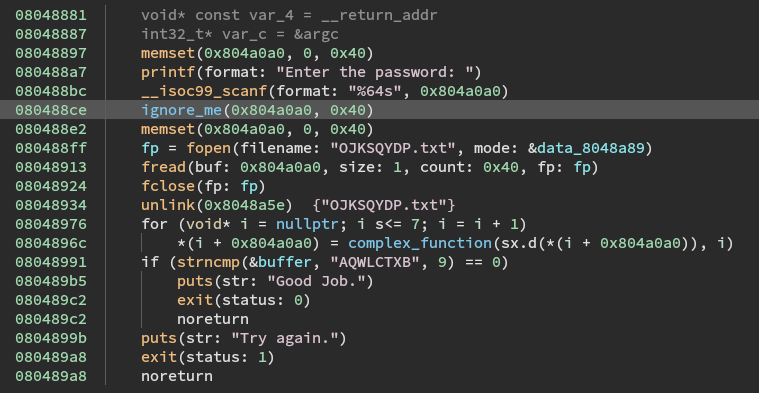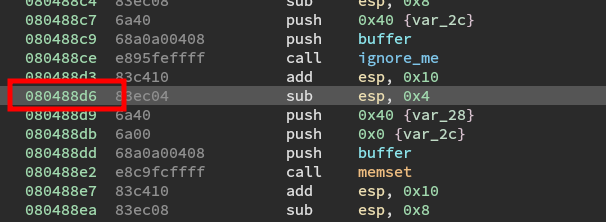07 Angr Symbolic File¶
Analyzing the Binary¶
Checking out main.

It looks like it is reading 0x40 bytes from a file named OJKSQYDP.txt.

It is interesting that the function only compares the first nine bytes of the result, and the string it compares it to is only 8 bytes. From this we know that the ninth character must be a \x00.

Based on this, we know:
- We want the script to start after the
scanf - We need to create a symbolic file
- The symbolic file should be named
OJKSQYDP.txt
Lets get going.
Building the Script¶
The starting point. I chose to set my starting address after the call to ignore_me.

So we set the start_address the filename and the file size in bytes. Then create the project.
path_to_binary = "./07_angr_symbolic_file"
start_address = 0x80488D6
filename = "OJKSQYDP.txt"
symbolic_file_size_bytes = 64
project = angr.Project(path_to_binary)
Next we need to build the symbolic file. This took a bit of reading through the Angr API docs as the instructions will no longer work. Here is how I built the file.
password = claripy.BVS("password0", symbolic_file_size_bytes)
password_file = angr.storage.file.SimFile(
name=filename,
content=password,
size=symbolic_file_size_bytes,
has_end=True,
)
As we create the initial state of the project we will want to provide the constructor with information on the simfile we just created. In preparation for that, we put it in a dictionary.
symbolic_filesystem = {filename: password_file}
Now we can create our initial state using the start address and the simfile we defined.
initial_state = project.factory.entry_state(
addr=start_address,
fs=symbolic_filesystem,
add_options={
angr.options.SYMBOL_FILL_UNCONSTRAINED_MEMORY,
angr.options.SYMBOL_FILL_UNCONSTRAINED_REGISTERS,
},
)
With the hard parts done we can create the simulation manager and run it.
simulation = project.factory.simgr(initial_state)
simulation.explore(find=is_successful, avoid=should_abort)
if simulation.found:
solution_state = simulation.found[0]
solution = solution_state.solver.eval(password, cast_to=bytes)
run_binary(solution, path_to_binary)
else:
raise Exception("Could not find the solution")
Final Script¶
import sys
import pwn
import angr
import claripy
def main():
path_to_binary = "./07_angr_symbolic_file"
start_address = 0x80488D6
filename = "OJKSQYDP.txt" # :string
symbolic_file_size_bytes = 64
project = angr.Project(path_to_binary)
password = claripy.BVS("password0", symbolic_file_size_bytes)
password_file = angr.storage.file.SimFile(
name=filename,
content=password,
size=symbolic_file_size_bytes,
has_end=True,
)
symbolic_filesystem = {filename: password_file}
initial_state = project.factory.entry_state(
addr=start_address,
fs=symbolic_filesystem,
add_options={
angr.options.SYMBOL_FILL_UNCONSTRAINED_MEMORY,
angr.options.SYMBOL_FILL_UNCONSTRAINED_REGISTERS,
},
)
simulation = project.factory.simgr(initial_state)
simulation.explore(find=is_successful, avoid=should_abort)
if simulation.found:
solution_state = simulation.found[0]
solution = solution_state.solver.eval(password, cast_to=bytes)
run_binary(solution, path_to_binary)
else:
raise Exception("Could not find the solution")
def run_binary(solution, path_to_binary):
if type(solution) == str:
solution = bytes(solution, "utf-8")
print(f"[+] Solution found: {solution.decode()}")
print(" [|] Running binary")
elf = pwn.ELF(path_to_binary, checksec=False)
pty = pwn.process.PTY
io = elf.process(stdin=pty, stdout=pty, level="warn")
io.recvuntil(b":")
io.sendline(solution)
output = io.recvline().decode().splitlines()[0].strip()
print(f" [+] Output: {output}")
def is_successful(state):
stdout_output = state.posix.dumps(sys.stdout.fileno())
return b"Good Job." in stdout_output
def should_abort(state):
stdout_output = state.posix.dumps(sys.stdout.fileno())
return b"Try again." in stdout_output
if __name__ == "__main__":
main()